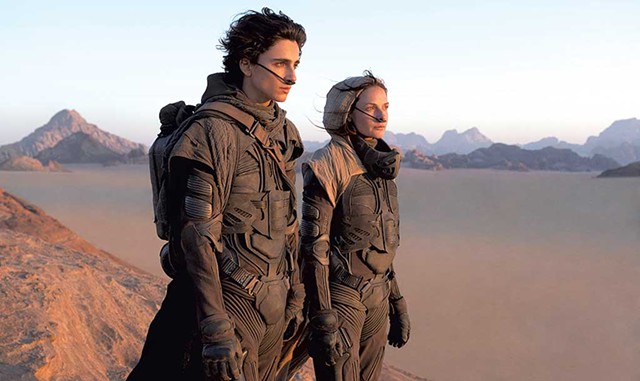
- Courtesy Of Warner Bros. Entertainment
- SAND TRAP Chalamet and Ferguson fight to survive the desert — and reams of exposition — in Villeneuve's sci-fi adaptation.
Frank Herbert's 1965 novel Dune is beloved by fans of brainy science fiction, and it's notoriously difficult to adapt to film. The 1984 version was a box office bomb that nearly derailed the career of up-and-coming director David Lynch. The Syfy Channel miniseries was more faithful to the book (and its sequels) but lacked the budget to make a space epic look epic.
Now, at long last, comes a new big-screen adaptation from Denis Villeneuve. As was Lynch in 1984, the Québécois director is up and coming, and he even has experience updating beloved sci-fi properties with his helming of Blade Runner 2049.
Villeneuve made the bold decision to adapt just half of Dune, leaving the other half for a sequel that has yet to be green-lighted. Did the book defeat him the way it defeated Lynch? Find out in theaters or on HBO Max, where the film streams for its first month of release.
The deal
It's not easy being a teenager in the far future. Paul Atreides (Timothée Chalamet) is the offspring of a feudal duke (Oscar Isaac) and an acolyte of a Jedi-style religious order (Rebecca Ferguson). His mom thinks he's a long-prophesized messiah, and the visions he keeps having suggest she's not wrong.
Political machinations force the House Atreides to relocate to the desert planet Arrakis, or Dune, which is the source of what's called "spice," a psychotropic drug that makes interstellar travel possible. To mine this precious substance (think oil), the galactic empire has colonized the planet, repressed its Indigenous residents and found ways to evade the voracious sandworms that roam the desert.
Paul is fascinated by the desert people, the Fremen, who also suspect that he's the messiah. A stealth attack by the Atreides' longtime enemy sends him and his mother on a perilous journey where death or transformation awaits them.
Will you like it?
Herbert's novel is a major feat of world building. Whether or not readers cotton to his weighty political and metaphysical notions, they'll come away with vivid memories of immersion in his feudal-futuristic universe.
Cinema is all about visual and aural immersion, and Villeneuve takes full advantage of those capabilities. His Arrakis is stunning on an epic scale, with sweeping, wind-sculpted forms — often viewed from the air — and a bleached palette that recalls the sci-fi cinema of the '60s and '70s. This film is more austere than Lynch's outré, steampunk vision, but it has a dreamlike quality that's indelible in its own way.
A story about the interplanetary battle to control a drug, Dune is an inherently trippy experience, and it's pleasant to let the sights and sounds of this version wash over us. From gadgets to costumes to production and sound design, the movie is an engrossing tour of Herbert's world. When it comes to those little things called characters and plot, however, we may find ourselves less satisfied.
The biggest stumbling block to any Dune adaptation is the sheer weight of the exposition. When I saw Lynch's version on its opening weekend, theater ushers handed out printed cheat sheets before the film, complete with a glossary — probably a first and last for a would-be blockbuster.
Villeneuve's version comes with no such external aids, but it's stuffed with dialogue designed to deliver maximum information. Combine that with Herbert's elevated, portentous diction, and you have a script that poses a challenge to even the most talented thespians: How to bring these archetypes alive?
As Paul's mother, Jessica, whose machinations drive large parts of the story, Ferguson shows us the doubt and terror between her spoken lines. Isaac emotes powerfully with his eyes. Javier Bardem brings depth and grit to the Fremen leader Stilgar.
But it's Jason Momoa, as Duncan Idaho, who gives the film brief and much-needed shots of charisma and — dare we say — even humor. One could be forgiven for wishing he were the hero instead of Chalamet's Paul, who comes off as callow and unformed. While the script hints at the conflicts complicating Paul's "chosen one" status, they remain on the drawing board.
With any luck, a sequel will flesh out those conflicts and give us a deeper look into the mysterious world of the Fremen. Breaking off at a point that is far from conclusive, this Dune feels more like a very long pilot episode than a stand-alone film.
That could be a problem for casual viewers; anyone seeking a fun space shoot-'em-up will be sorely disappointed and probably bored. The very elements that make Dune intriguing and refreshing for a high-budget genre movie also make it exhausting. But would I watch a sequel? Yep.











Comments
Comments are closed.
From 2014-2020, Seven Days allowed readers to comment on all stories posted on our website. While we've appreciated the suggestions and insights, right now Seven Days is prioritizing our core mission — producing high-quality, responsible local journalism — over moderating online debates between readers.
To criticize, correct or praise our reporting, please send us a letter to the editor or send us a tip. We’ll check it out and report the results.
Online comments may return when we have better tech tools for managing them. Thanks for reading.